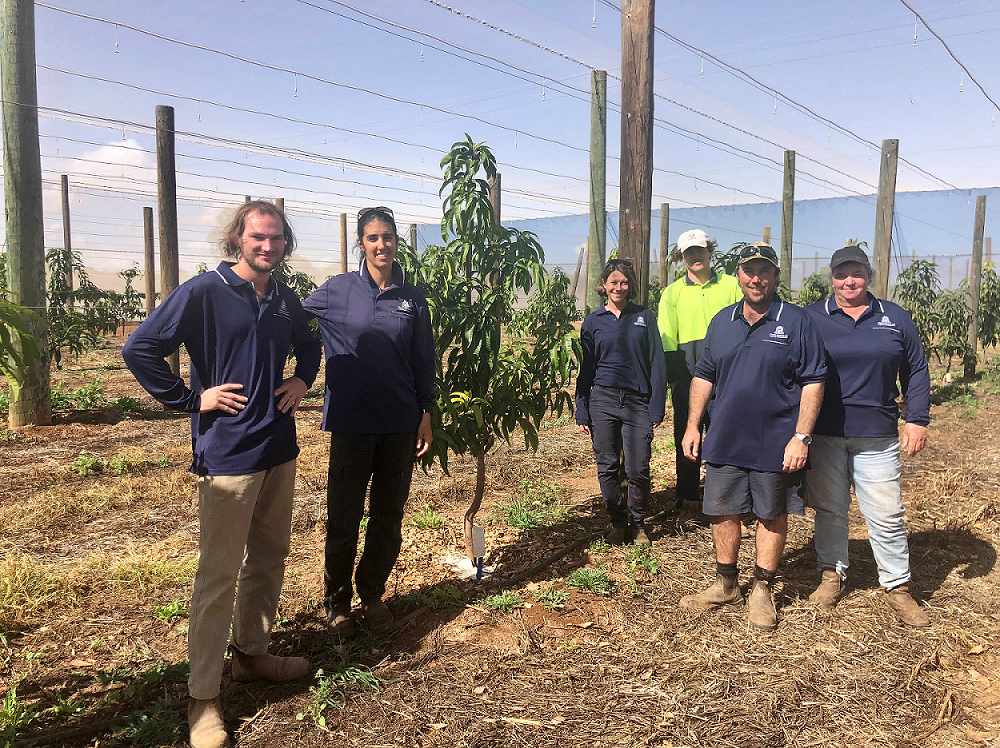
Research at the station has been reinvigorated in recent years with infrastructure investments, including a Retractable Roof Production System (RRPS) and protective cropping structures, as well as staff appointments.
DPIRD Carnarvon research support manager Annie van Blommestein said the RRPS had created the opportunity to modify the growing environment to evaluate crop management practices for the main vegetable crops grown in the district.
“A trial to evaluate the RRPS microclimate for tomatoes, capsicums and zucchini production show the adverse effects of extreme weather conditions could be overcome, like high temperatures, strong sunlight and low humidity,” she said.
“Preliminary results from the first trial suggest tomato yields and quality from the RRPS crop were improved, compared with the field grown winter crop, while the results were even more promising for capsicums.
“The presence of insect pests, disease and weeds was also lower with the RRPS, as the roof could be closed to prevent unwanted rainfall.
“Initial results show natural pollinators, such as bees, were able to enter the RRPS, although more research needs to be done to validate these findings.”
In 2022 an investigation into optimum planting windows for capsicum commenced in the RRPS, with a particular focus on Integrated Pest Management.
DPIRD continues its work with eight seed companies on variety trials of capsicums, chillies, tomatoes and melons to evaluate emerging genetic material that may be suitable for the Carnarvon environment.
The trials include 75 varieties of capsicums, 10 varieties of chillies, as well as 48 round variety tomatoes, two bush, 11 Roma, 23 grape and 16 cherry, as well as rockmelons, watermelons and piel de sapo Spanish melons.
Research on the tomato fungal disease fusarium wilt, which is a significant challenge for Carnarvon growers, was also discussed.
“The DPIRD vegetable research team has been collaborating with seed companies to examine the performance of several new tomato varieties that have resistance to the three strains of fusarium wilt,” Ms van Blommestein said.
“Preliminary results show that resistant varieties performed well on infected soil, in comparison with the susceptible control variety, and it will be interesting to see the yield result come harvest.”
A trial of six varieties of persimmons under a netted, protective cropping system was also toured at the field day, which is expected to be ready for harvest in February and March – potentially capturing high early season prices.
An understory of the perennial herb Gypsophila, or baby’s breath, will soon be sown to the persimmon trial as a bio accumulator to remove boron, as persimmons are highly susceptible to boron toxicity, which restricts plant growth.
“This ground breaking trial will assess how much boron is removed from the soil and the potential for the baby’s breath to be composted and used in areas with low boron as a natural fertiliser,” Ms van Blommestein said.
A mango cultivar evaluation trial of 14 different Indian, salt tolerant and high yielding dwarf varieties was examined during the field tour, which was planted in November 2020 and expected to come into production in 2024.
A jackfruit canopy training trial, co-funded by the Cooperative Research Centre for Developing Northern Australia, that will examine the response of one commonly grown variety to single, multi-leader and trellising techniques, including espalier and cordon, was profiled.
An additional planting of locally sourced and commercial jackfruit varieties propagated by seed will be assessed for plant vigour, growth habits, timeframe to harvest, productivity and fruit quality.
The field day also viewed a DPIRD-Meat and Livestock Australia nursery trial of the tropical forage legume Leucaena, with plants bred and selected for sterility. The trial has shown promising results with many productive plants that have flowered but with little or no seed production.
For more information about DPIRD’s Carnarvon Research Station, visit the department’s website.
Picture caption: DPIRD Carnarvon officers Louis Schelfhout (left), Annie van Blommestein, Mel Ford, Sam Kent, James Barr and Valerie Shrubb attended the recent department field day.


